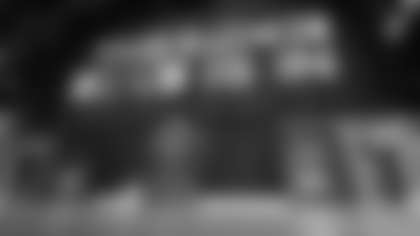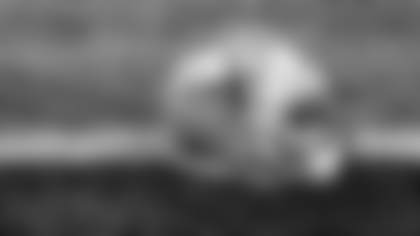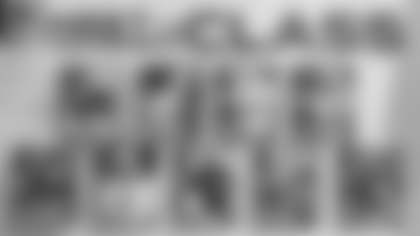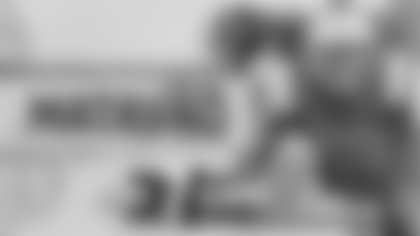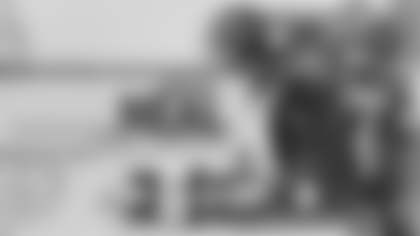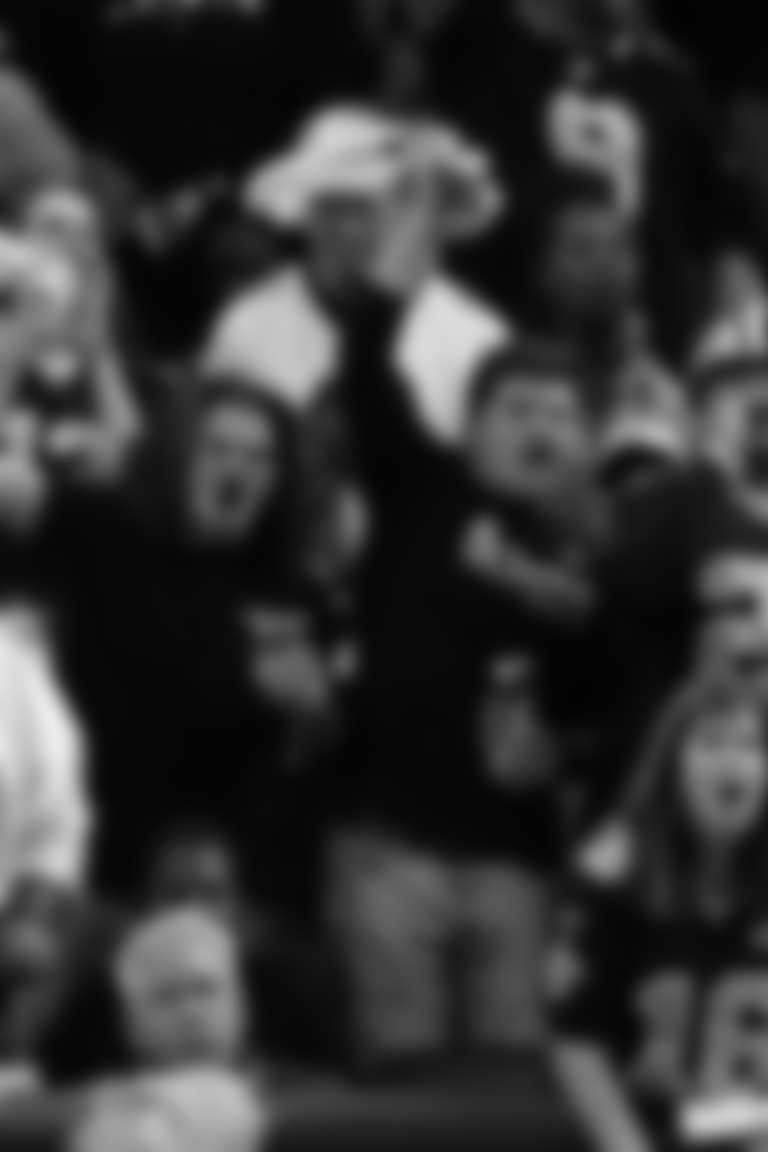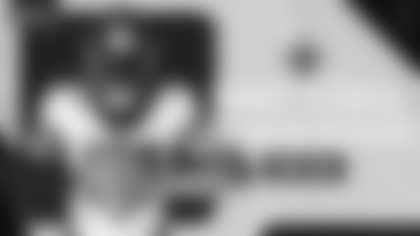New Orleans Saints Executive Vice-President/General Manager Mickey LoomisPre-Draft Press ConferenceWednesday, April 25, 2018
Are quarterbacks rated higher on your draftboard than maybe they were five to eight years ago?
"No, I don't think so. I wouldn't say that. We build our graph board based upon the evaluations that our scouts and coaches do and then obviously there's an adjustment then we make you know so that we can put them in a position where we can get them if we want them. But that's built upon the evaluations relative to the rest of the class. So I wouldn't say that they're higher or lower than they've been. There's no adjustment for an implied value."
Do you feel that free agency has set you up to be able to draft the best player available if you want to?
"I think we're going to do that regardless. But I would say there's some things that we still have to accomplish that we didn't get accomplished in free agency. That doesn't mean that we have to get that done in the draft. There's time afterwards before training camp gets started. But, I think we're still in a good position."
When you would say you would take the best player, is that best player regardless of position or is there a need element involved?
"I have said this before, what happens is it is never just one guy sitting up there and everybody else is gone. You have a group of players that are all graded pretty closely together when you pick more often than not and certainly position comes into play, when you make that pick, when you have a group of guys who are close together. It may be a position of need for your team, but it also may be that that position is more valuable than another one."
What are some of the needs you still have to fill?
"I'd rather keep those to myself. I'm not going to give you guys any indication (laughter). You can all guess that. I know Sean (Payton) talked about our needs and some things yesterday and I think he named every position right (laughter)? That's what I would have done."
When you have a group of players, how much is the emphasis on fit in terms of helping you make a decision? Is there a lot of emphasis on how this player will fit your team?
"Absolutely. Our evaluations, we start with what are the skills? What's the makeup of the player in terms of character and football intelligence and all those other things. And then it's also what's our vision for that player for the New Orleans Saints? All those things come into play when you know before we draft."
With no second round pick and sitting at 27, would you be more proactive in trading down because you have only one pick in the first 90 in an effort to supplement that?
"I wouldn't say that because look there may be a target on someone that we have going forward that if we can get this one guy then that's worth giving up some of our other assets. So I think we're open to either, although historically I think we've done a lot more trading up than we have trading back. I recognize that."
Across the board why do you think your team has had success in drafting and developing players out of smaller schools starting with Jahri Evans out of Bloomsburg in 2006 as an example?
"I think it starts with our coaching staff and with the coaches and Sean (Payton) in particular is that he doesn't care how a player gets here. He's going to play the best players. And so I think that gives our scouts, our pro guys, our college guys, our coaches, it gives them incentive to dig. Dig for guys that they like, that maybe were acquired in an unconventional manner. We have had success with some of those guys. Lots of teams have had success in the later rounds and in (undrafted) free agents etc. I think that's the important element here is that once we get them (here), we don't care how they got here. Our coaches are going to coach them hard and we're going to play the best players."
How often are you thinking about trades for the draft or does it just come up in the specific rounds?
"We're thinking about trades a month ago. We're thinking about opportunities I would say, whether that's know trading up or trading down, player for player. We're always thinking about opportunities to improve our roster, get guys that fit what we want to do and that changes. It changes based upon who might be available or who you might have signed in free agency or who you think might become available in the draft you know where you're picking. It's a lot more difficult when you're at 27 as opposed to being in the top 10 or11th or some of the places we've been the previous few years."
What are your thoughts in terms of draft depth positionally?
"That's a good question. I think it's pretty evenly spread across the board. I don't think there's anything atypical here. That's my first impression or (what) my current impression is. I wouldn't say that there's one position or two positions that are really, really deep and relative to other years."
Defensive end has been a needs in the past, but how do you project how guys like Trey Hendrickson and Al-Quadin Muhammad might produce moving forward?
"We've seen some evidence. We have them in practice. We have opinions and obviously we have a better feel for what they can and can't do than we did a year ago and yet there's going to be some growth. There's always a lot of growth between your first year and second year and even the third year. I think we're encouraged by what we've seen by those players and yet I don't know that there's any certainty."
There's been a lot of chatter about fewer true first round grades this year than the last couple of years. What do you think of that?
"I don't think we would say that."
What has Jeff Ireland brought to the room since 2015 and what has be brought that has blended into what was already there?
"He has been here for three or four years now. Jeff is awesome and he's done a great job for us and he's taken some things that we've done you know in our system and added to it. He's brought some new things to us. I think he is really good at making sure that our scouts understand exactly what our coaches are looking for. I think he is really good at understanding that each players' skills, that's not the end of the evaluation. They have a skillset and what's the vision for that skillset with our team based upon what our coaches are looking for. I think the main thing here besides the evaluation part of it itself is being able to have a vision for each player and what he can bring to our team. I think that that is one of the reasons why a year ago we had so many guys contribute to our team as young players, is that we had a clear vision for each one of them and that comes from Sean and gets communicated through Jeff to our scouts and is part of our decision making process."
How much of this is luck?
"Oh yeah there's definitely some of that."
Can you reference a previous time where you wanted a certain player and you wound up with somebody else and maybe it just turned out to be a better thing?
"Yes, just look at a year ago. I don't know how many mock drafts we did before (the real draft took place). Not one of them did we have Marshon Lattimore come to us. I don't want to say luck, that's probably not the right word but he fell to our spot and it was pretty clear cut hey this is the guy we've got to take and want to take. And so if you want to call that luck, that's what it is when someone falls to you that you don't expect. There's lots of examples of that over the years. You've called me on the carpet here. They're not coming right to mind, but I know there's been lots of examples. Will Smith was one years ago that not many of the mock drafts that we had that year did Will Smith end up at our pick and yet there he was. I don't recall. I remember that year, but I also remember that defensive end wasn't a position that we felt like we needed coming into that draft in the first round and yet there he was and we had to take him and it was a great pick, a great pick for us and he a great career for with us."
If there was a guy similar who is rated much higher and available but not at a position of clear need, would you take him?
"Yes, we take them, absolutely. You figure it out (later). Jeff (Ireland) says this a lot, sometimes it is not a bad thing to build on a strength, add to a strength. We agree with that."
How do you feel about how things are going with the Pelicans now?
"I think I'm just like everyone else in the city. We're excited about it, right? (I am) Impressed with the job that Alvin (Gentry) and Dell (Demps) have done, given some adversity during the season and looking forward to more."
What do you attribute to the team having so much success with the drafting of former Ohio State players?
"First of all they a lot of good players every year. It's coincidence that that we have taken a lot of their players. It is not something that we target every year. There are a lot of schools that have a lot of good players and again it comes back to how did the draft fall that we have had success with the Ohio State guys all the way back to Will Smith. They have good players that are well-coached. They love football, they practice hard, all those things."
On the other end, is it just how a draft goes where you have not chosen many LSU players the last several years?
"We don't have anything against LSU. You guys ask me that every year. They've had a lot of players at LSU that we've liked. Conversely (to the Ohio State picks), they haven't been available to us when we'd like to pick them. They do a good job at LSU identifying talent and putting guys in the league and look we hate playing against them. We'd like to have more LSU guys."
Has it come to a point where all the Ohio State guys get to thrive when they get an opportunity here because they are so used to each other?
"No, I wouldn't say that. Although, look we get information from our current guys about players that are playing at OSU. We do have a little access to some information that may help us."
Does how close you guys were last year change your short-term and long-term variables approaching the draft?
"I wouldn't say that that's a big variable at all. Maybe something small, but I would not say that. I think our approach is the same. We're looking for players that we have a vision for that can help us both in the short-term and the long-term. We look for the best players we can get for the Saints and I wouldn't say that's a big consideration. Look, the impact is that we're picking later. But I wouldn't say anything else is different."
How hard is it to follow up on an impact draft like last year? Do you go back and appreciate more what happened last year because you have had some really good drafts, but that one was off the charts.
"We've had some poor drafts too. I'm well aware of that. First of all, we had five picks in the first three rounds last year. We don't have that opportunity this year. We've got two and we're picking later and so the opportunity is different. I certainly appreciate how big an impact that class had a year ago and yet I'd also say this, that's one year. Let's not anoint that class as a big group of hall of famers or anything like that. They've had a good season. It's a good season that we can build on and we are excited about them. But I wouldn't say that class is a finished product yet. It shouldn't and doesn't impact on how we approach this year's draft at all."
How much do the trade value charts play a role in trades currently?
"Everyone has them and I think everyone uses that, most everyone uses those charts as a guideline. We pay attention to what has happened historically at every pick. I have looked at trades that are similar, going from 27 to whatever. Has that happened before? What was the cost? Then you look at A, what are the other trades where you've moved up 26 spots and so we look at history. We look at the point value charts. There's several different ones, so you can have to understand what chart the other teams using and then look it's still a marketplace that two people have say yes too. So it's a negotiation."
Has the chart changed throughout the years for you?
"Yeah it has."
Is there a big gap between the bottom of round one and the top of round two in terms of the value of the points for a trade?
"It's not that far apart. No, I wouldn't say there's a big difference. It's pick 32 or pick 33 so you really have to order them that way in terms of a player. Now there's a contract difference that you it creates. You have five years (contracts) available to you in the first round and four year (contracts) in the second round."
Is it in your best interest to trade from the back of round one to the top of round two if you have a guy who you think would be available at the top of round two who you have graded for 27?
"Maybe, that's specific to who's available and the player available and then that's when position may come into play too. We might get an equivalent player, but it might be a position that's less valuable to you."
How has your draft value chart changed over the years?
"I think the first significant change happened when we got a rookie system and changed the contract amounts that you're paying at the top of the draft and that shifted a little bit. Otherwise, I wouldn't say it's changed significantly. It's changed, but I wouldn't say that it's changed significantly since there's these little tweaks every year that happen."
How many trades get discussed that don't actually happen?
"Now that's a good question. Ten times as many that actually happen. I don't know. We'll talk with them and have a conversation with virtually every team in front of us and the 15 teams behind us at some point. Now that's a conversation that's not necessarily something that is likely to happen, but we'll have a lot of conversations. Every team will and they want to understand what the dynamic is. Who's looking to come forward, who's looking to move back. Those conversations are happening now."
Do you think the ability to trade compensatory picks change the draft landscape at all?
"Since we rarely get a comp pick I don't pay a lot of attention to it. It's changed some it's made those comp picks more valuable. I think at the end of the day that's what it's done and given the teams that get them more assets. They're more valuable just by virtue of the fact that they're available in trade."
How much do you think the team needs to find a pressure player?
"Yeah, I think we will see. There's a number of players that we would identify as pressure players in this draft and we will see if we have opportunity to draft them, but I also think this, I think every team of 32 teams would say they desire a pressure player. They impact the game and so all of us are looking for that and those players."
A pressure player isn't considered just an edge rusher?
"You can get pressure from interior just as well you can get it from an outside player."
How difficult was it to let Willie Snead go to Baltimore?"
Willie's a good player and did a lot of good things for us and so it's just decision about how we're allocating resources at the end of the day, but look he'll do well. You know I can't say enough good things about Willie Snead. Last season some things happened that were a little bit unfortunate that impacted his season, but he'll bounce back and have a great season."
Have you thought about what these three days will be like not having Mr. Benson in the building engaged in the draft?
"Absolutely, I've tried not to think about that. We miss him on a daily basis and the success of the Pelicans and his excitement level would have been off the charts and having a horse in the Kentucky Derby and all these good things that have happened the last few weeks' man he would have enjoyed all of that so much and I think he gets his greatest enjoyment by seeing how the city reacts to those kinds of things and so he will be missed. We'll have an empty chair for him and we'll be thinking about him for sure."



